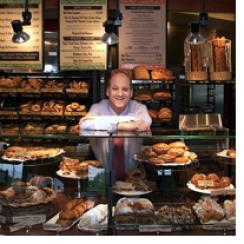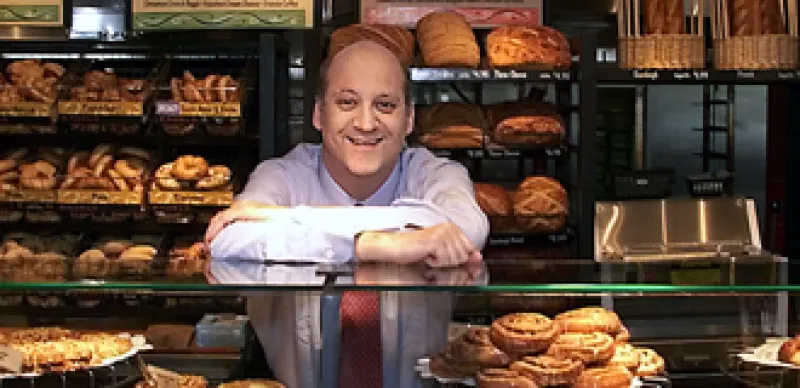
The faltering economy undoubtedly affected many of the people eating sandwiches and drinking coffee at their local Panera Bread café. But at the Panera Bread Co., it barely registered a blip.
The company’s executives acknowledged the recession, of course — but they managed for the recovery. They refused to tarnish the Panera brand by slashing prices; instead, they used new menu items and new china to lure customers. They insisted that each café, whether company-owned or franchised, continue to bake fresh bread each day, and to use relatively costly antibiotic-free and organic ingredients. They promoted Panera cafés as hangouts, complete with free Wi-Fi. They knew full well that letting people sit for hours for the price of a smoothie might not be immediately profitable, but they believe that positioning Panera as a meeting place could be great for it down the road.
The stick-to-your-buns strategy clearly worked. In its 2009 fiscal year ending December 29, Panera earned $86 million on revenues of nearly $1.5 billion, up from earnings of $67 million on revenues of $1.3 billion in 2008 — even though that fiscal year was one week longer. The company added 30 cafés, bringing its total to 1,380 (795 franchised), and is planning to open at least 80 more this fiscal year. Revenue from outlets open more than a year rose 2.3 percent in fiscal ’09.
Panera’s stock, which has ridden a roller coaster for much of the past two years, has been steadily rising since last fall, closing at around $79 in mid-March.
That’s good news for all of Panera shareholders, of course. But for Ronald Shaich, Panera’s CEO, it has a special resonance: It means he is going out on a high note.
Next month Shaich, who cofounded Panera in 1991 and helped take it public in 1999, is ceding the corporate helm to William Moreton. Shaich, who will become executive chairman, plans to spend a couple of days a week tending to Panera business, but he is now excited about the public-sector world.
“Too much of our society operates on expediency,” says Shaich, 56. “At Panera we’ve always taken a medium- to long-run approach to problems. I want to apply that approach to public policy and to nonprofit groups.”
During a recent conversation with Institutional Investor Senior Contributing Writer Claudia Deutsch, Shaich talked about Panera’s future — and his own.
Institutional Investor: Panera is often categorized as a “fast casual” restaurant. What does that mean? And who is your main competition?
Shaich: I don’t know what “fast casual” means either. We compete with different companies at different times. At breakfast, we’ll compete with Dunkin’ Donuts and Starbucks. At lunch we’ll compete with anyone who’s offering soup, salad or a sandwich near your office and in your price range. Then there’s what I call our “chill out” business — come 2:00 p.m., you’ll see kids with laptops, housewives chatting, pharma reps talking business. For that we compete with any place that is comfortable to meet. And, of course, there’s our take-home bread, which is competing with any of your neighborhood bakeries.
People ate out less during the recession, yet Panera managed to stay highly profitable. How?
We didn’t cut prices, but we did stress products that gave us a higher gross profit. We introduced a chicken cobb salad, for example, that cost us maybe $1.50 but that we could sell for $8. That’s more profitable than a chicken sandwich, which sells for $7.50 and gives us $5.50 back.
You used to own Au Bon Pain, which was a well-known brand in New York and other urban areas. Yet you jettisoned it in 1998, in favor of the lesser-known Panera brand. Why?
Au Bon Pain was my first child, and that was the most difficult decision I ever made. But Au Bon Pain had tried to be all things to all people, to serve the CEO, his secretary and the guy just walking in off the street. That business model required being near huge office buildings, so geographic growth was going to be hard to maintain.
In the mid-1990s we acquired the St. Louis Bread Co., which had 19 stores and no clear growth strategy, and we combined everything into Panera Bread. By 1998 we realized that the Panera cafés were our real gems, and that everything else was a distraction. So we sold our other businesses, including our frozen dough factory and all the Au Bon Pains.
How does a Panera café differ from an Au Bon Pain — or from any other casual restaurant?
We found our niche by capitalizing on two trends. One was that places like McDonald’s and Burger King were no longer viewed as great for family meals, but rather as self-service gas stations for the human body. The other was that people were growing tired of Wonder Bread or supermarket breads that sold for 99 cents for three loaves. So we made fresh-baked bread our main platform. It represents the quality that people want in their food, and the warmth that they want in an oasis where they can hang out. People still discover us through our bread, and soon realize it’s not our only product.
You have headquarters in both St. Louis and Boston. Why do you need two corporate bases?
Our legal headquarters is in St. Louis, and I live in Boston, but in practice we don’t really have any headquarters. We let the 100 to 150 people on our management team live wherever they want. They spend half their time on the road anyway, so why uproot their families? Our head of food services is in Syracuse, New York, and our head of training is in Louisville, Kentucky. Once a month or so we all meet somewhere in the country. We’re in our third generation of videoconferencing equipment.
Do you ever hold your meetings in Panera cafés?
Absolutely not. We wouldn’t close down the store for a day. But we certainly visit them — and sometimes the best part of the meeting is the conversation we have on the bus afterward.
You have Panera cafés in 46 states, and many of the most successful are in big cities. Yet even the plunging real estate prices of the past few years didn’t lure you to Manhattan. Why not?
We don’t shoehorn our cafés into tiny spaces; we typically need upward of 4,000 square feet. And even depressed Manhattan real estate is at pretty high price levels.
You still seem to brim with enthusiasm for Panera and ideas for its growth. Why have you kicked yourself upstairs?
Ten years ago I told Panera’s board I wanted to explore a nonprofit or public policy role, but I promised I wouldn’t do anything until I thought that Panera’s senior management was robust enough to run the company, and that there was a CEO who could bring the right perspective. All of that exists now.
Yet you are going to spend several days a week at Panera. Is it really fair to keep looking over new CEO Moreton’s shoulder like that?
I don’t intend to micromanage. But I’m still a major shareholder, and I’m as committed to Panera today as 20 years ago. So I’ll work on product development, on marketing, on innovation projects, and I’ll act as mentor. And over the next year and a half, I’ll really figure out what I want to do next.
Can you give us a sneak preview?
I’d like to create the first national organization of cafés in which poor people are served with dignity but without charge. And I’d like to bring management principles to state government. Here in Massachusetts, three of the last four speakers of the house have been indicted. We elect governors to protect us from our legislators. I’d love to study the 50 state legislatures, benchmark best practices at each and apply them to Massachusetts.
You seem to have equal love for business and public service. Which path would you like to see your 11-year-old son follow?
I’ve never viewed the role of CEO as anything less than a high calling of humanity, so I’d love for my son to go into business. In business you get to solve problems, to actualize yourself, to be creative. But I don’t want him walking in my shoes; I want him to create a business of his own.
Has the recent economic debacle soured you at all on business, or on CEOs?
As a society, we grew too short-term oriented, and we got the economy we deserve. There was a time when people invested in companies for four years; today, 60 percent of trading is day trading. You’re pressuring money managers to deliver immediate returns to your 401(k), so they’re pressuring CEOs to deliver short-term results.
Can the system be fixed?
We have to push our public companies to resist that pressure, to manage for the medium and long term. And we have to put real teeth into regulation, particularly of Wall Street and particularly of any company that is too big to fail.






